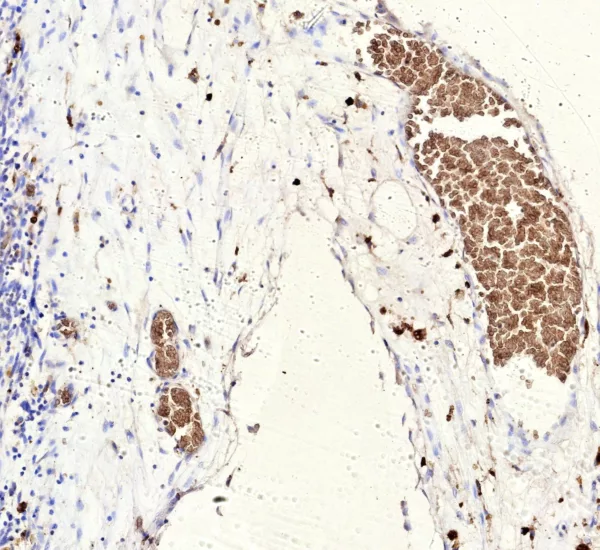
The FLI-1 (MRQ-1) Mouse Monoclonal Antibody is a highly specific immunohistochemical reagent designed to detect the Friend Leukemia Integration 1 transcription factor (FLI-1), a nuclear protein that belongs to the ETS family of transcription factors. FLI-1 is a key regulator of hematopoiesis and vascular development and is commonly used as a diagnostic marker in Ewing sarcoma, vascular tumors, and certain hematologic malignancies including lymphoblastic lymphoma and leukemia. This antibody is optimized for immunohistochemistry (IHC) on formalin-fixed, paraffin-embedded (FFPE) tissue sections. It produces strong, clean nuclear staining, allowing for reliable identification of FLI-1 expression in various tumor types. Its specificity and minimal background make it a powerful tool in diagnostic pathology, especially for differentiating small round blue cell tumors, and distinguishing vascular neoplasms from morphologic mimics. The MRQ-1 clone offers excellent performance with automated staining systems and is compatible with a wide range of detection reagents. It is widely trusted in both clinical pathology labs and research settings focused on oncology, hematology, and developmental biology. Clone: MRQ-1 Host Species: Mouse Target Protein: FLI-1 (Friend Leukemia Integration 1) Applications: Immunohistochemistry (IHC) on FFPE tissues Staining Pattern: Strong nuclear staining Species Reactivity: Human Use Cases: Diagnosis of Ewing’s sarcoma/PNET Identification of vascular tumors (e.g., angiosarcoma) Detection of hematopoietic tumors, including leukemias and lymphomas Differentiation of small round blue cell tumors
Mouse Monoclonals, Recombinant Mouse Monoclonals
Mouse
Human
IgG2b / Kappa
Nucleus.
FLI1
Human tonsil, Ewing's sarcoma (EWS) or angiosarcoma. THP1 or Raji cells.
Recombinant fragment (around aa200-400) of human FLI1 protein (exact sequence is proprietary)